Recent prosecutions show that the biiironment Agency is winning the
Page 28

Page 29

If you've noticed an error in this article please click here to report it so we can fix it.
battle against fly-tipping. But as economic cuts 'bite, can this success continue?
Words: Mike Sherrington Fly-tipping, the illegal dumping of waste in a place other than a designated disposal area, is particularly attractive to law breakers. Massive profits can be made by undercutting legitimate businesses that have to pay the high costs of disposing of waste legally, estimated by the government at more than £101) a tonne.
Scams include: disposing of waste overseas in containers marked as showing legitimate export goods: colluding with landowners to dispose of waste on their land; and operating seemingly legitimate plants without a licence.
Penalties for fly-tipping are hefty sentences, including jail and confiscation of vehicles and illegal profits.
Only registered carriers can legally transport controlled waste. Operators must demonstrate that they can handle controlled waste safety and in an environmentally sound manner. Failure to do so can result in a prosecution. Responsibility for policing fly-tipping is split between local authorities and the Environment Agency, which deals with larger cases of fly-tipping, including those involving dumping more than one lorry load (20m3) and dumping hazardous waste.
In May this year, the Environment Agency prosecuted nine firms for illegal dumping. Maidstone Crown Court fined the firms a total of £74,250 for illegally dumping enough waste to fill three Olympic-size swimming pools at Polshill. Kent. between April and May 2008.
In 2006, the agency secured jail sentences of 22 months for Patrick Anderson and 14 months for James Kelleher of Dagenham after they illegally dumped 14,600 tonnes of waste in London and Essex.
The effect of fly-tipping on properly-run businesses worries the Environmental Services Association (ESA), which represents waste managers. The high cost of legally disposin.g of waste means the incentive to dispose of waste illegally will become an increasingly attractive option to unscrupulous operators," says a spokesman.
"This undermines legitimate waste businesses," he says.
Government figures put the cost of disposing of a tonne of mixed waste at more than £100, which is made up of the collection cost, the fee to gain entrance to a licensed site, and landfill tax, at .1:48 a tonne. However. landfill tax is set to rise by £8 a tonne every April to reach a maximum of i72 by 2013.
Nick Deal. group secretary of the Road Haulage Association waste disposal group, believes the escalating cost of landfill tax could lead to more fly-tipping.
lucre is considerable difficulty in getting planning permission for legitimate waste disposal sites, especially those that incinerate waste. The Waste Electronic and Electrical Equipment (WEEE) regulations mean electrical equipment can't be disposed of in landfill sites, but has to be taken to a place where it can be broken down for recycling. Electrical equipment, along with tyres, are among the items most often disposed of illegally.
"There is an increasing trend to pack these goods into containers and export them illegally with false documentation.This poses a significant threat to drivers who may carry a container believing they are transporting what it says on the manifest. only for the authorities to find that it contains illegal waste. They can be fined heavily or even have their vehicle confiscated."
The Environment Agency and local authorities are slowly winning the battle against fly-tipping, with 9% fewer incidents, and enforce ments 4% up in 2008-2009 compared with the previous year. Some authorities are using sophisticated techniques to prevent fly-tipping. The London Borough of Sutton uses legislation intended to combat terrorism, the Regulation of investigatory Powers Act, to snoop on potential dy-tippers, although it has not vet resulted in any prosecutions And the Environment Agency is working with the police to stop and search vehicles it suspects of carrying waste without a permit, which has resulted in successful prosecutions.
However, the question remains whether this success can continue. Fly-tipping becomes a more attractive option in times of economic stringency when government departments face severe spending cuts."It is too early to say how proposed budget cuts will be implemented," says an Agency spokesman.
"However, we have been making efficiency savings over the past year to maintain frontline services." •
























































































































